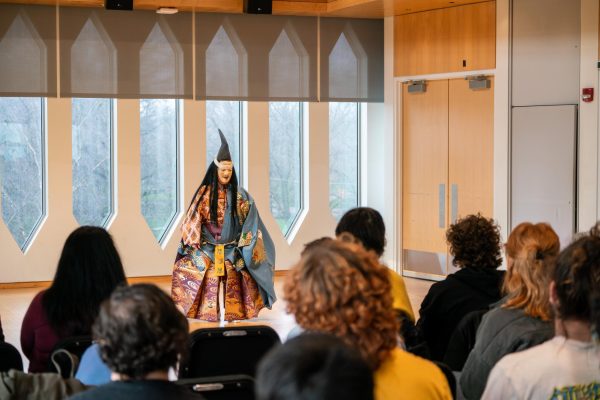Theater Degrees Lead Students to a Wide Variety of Careers
It is easy to argue that certain humanities degrees are marketable. English, History, Politics, and several other “scholarly” fields cultivate strong writing and research skills. But for creative majors, like Theater, doubts over financial security sometimes hover on the horizon. However, Assistant Director of Career Development Center Josh Koller, OC ’18, who runs the Arts and Creative Professions Career Community, attests to Oberlin Theater majors’ versatility in the job market.
“We have Theater majors working in the business and marketing world, writing, developing websites, doing data science, and entering law school,” said Koller. “You have so many skills that you’ve developed in that major. You’ve learned how to cohesively work in a team, budget time, put together production, envision an end product and work toward it, and speak publicly in a comfortable manner. Employers in basically every sector are interested in all of these things. For me, your options are primarily defined by what’s important to you.”
Oberlin Theater graduates are talented, highly versatile, and valuable employees, according to Ben Ferber, OC ’11, who majored in Computer Science and Theater.
“The type of theater people that Oberlin puts out have a lot of skills and cross the disciplines,” Ferber said. “That’s not everyone. Oberlin puts out people who are just actors, and that’s great! But overall, Oberlin puts out generative artists and professionals who have a lot of things to bring to the table.”
Jenna Bergstraesser, OC ’14, who now designs costumes, parades, and events for The Walt Disney Company, explained that theater employers are often impressed by Oberlin students’ direct experience with their craft.
“The creative experience you will have at Oberlin is incredible and unparalleled,” Bergstraesser said. “For a lot of the schools my fellow designers come from, they’re set up to only let students be in one or two shows since it’s so competitive. But we have so much student theater … Graduating, I had 10 shows that I had costume designed under my belt from undergrad, and that’s virtually unheard of.”
Still, no matter how skilled a candidate may be, the lower demand for creatives poses a challenge. Ferber confirms that the struggle to find long-term employment as a theater professional is ongoing.
“Theater is a field in which it is very difficult to get a job, because there are just not many jobs,” Ferber said. “During the financial crisis, which happened while I was in college, and of which we are still feeling the effects today … a lot of paid jobs went away. Many lower-income people, who didn’t have a lot of family wealth or the ability to make fairly tiny amounts of money, simply didn’t have access to a professional opportunity in theater until much farther up the chain.”
However, for many hard-working theater majors, it is possible to create a viable career in theater, according to Bergstraesser.
“You have to be very self-driven, and if you are, you can make it work,” Bergstraesser said. “I did all the research on internships on my own, built an independent study that involved creating a portfolio, and got [Costume Designer and Associate Professor of Theater] Chris Flaherty to be my advisor. … You can definitely do it, but you have to be prepared to figure some things out on your own.”
While graduates like Bergstraesser forge their path in the theater sector, other Theater majors may also choose to work in a variety of non-drama-related jobs. Koller stressed that it’s entirely feasible for a Theater graduate to become a lawyer or a doctor.
Koller described that all of these qualities are part of “transferable skill sets,” which include communication skills, time management, leadership, and intercultural fluency.
But a transferable skill set is not exclusive to an Oberlin Theater degree. Koller points out that it’s a highlight of a liberal arts education.
“There’s a hard skill set that you can walk away with from computer science that will be different from theater, but so many of those transferable skills overlap,” said Koller. “That’s the buy-in for Oberlin. There’s this liberal arts education that you know you’re going to get, regardless of Theater, Computer Science, Biology, or Africana Studies.”
While the stereotype that Theater majors struggle to find work after graduation stems from a small kernel of truth, the breadth of skills that Obies pick up during their liberal arts education proves that Obies pick up during their liberal arts education proves that there is still value to pursuing careers in theater.









